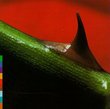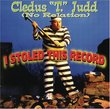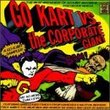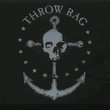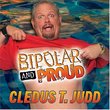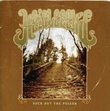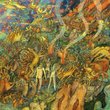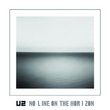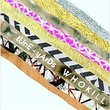| All Artists: Mike Ladd Title: Negrophilia: The Album Members Wishing: 2 Total Copies: 0 Label: Thirsty Ear Release Date: 2/8/2005 Genres: Dance & Electronic, Jazz, Pop, Rap & Hip-Hop Styles: Electronica, Avant Garde & Free Jazz, Dance Pop, Experimental Rap, Pop Rap Number of Discs: 1 SwapaCD Credits: 1 UPC: 700435715622 |
Search - Mike Ladd :: Negrophilia: The Album
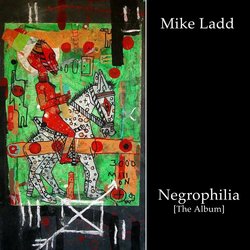 | Mike Ladd Negrophilia: The Album Genres: Dance & Electronic, Jazz, Pop, Rap & Hip-Hop
Mike Ladd is regarded as one of the urban worlds most creative and diverse — entities. Charting a strangely macabre, yet familiar territory, he has once — again sculpted a truly entrancing recording. Much like a strange — bac... more » |
Larger Image |
CD DetailsSynopsis
Product Description Mike Ladd is regarded as one of the urban worlds most creative and diverse entities. Charting a strangely macabre, yet familiar territory, he has once again sculpted a truly entrancing recording. Much like a strange back alleyway, it beckons you to wonder what lies beyond the shadows and lights. The goal of this record is to serve as an organic backdrop to a digital landscape. -Mike Ladd I n s p i red in part, by Petrine Arc h e r-Straw s book, N e g rophilia, Mike Ladd has combined his own thoughts and visions with renowned drummer Guillermo E. Brown and pianist Vijay Iyer, who returns to work with ladd on the heels of last years critically acclaimed In What Language? re c o rd. What emerges is a low down, but high minded sound excursion. Melding natural and synthetic sound, this album engages the listener with the urgency of futurism, while also hearkening to a not-too distant past. Similarly Requested CDs
|
CD ReviewsRevelatory Troy Collins | Lancaster, PA United States | 07/27/2005 (5 out of 5 stars) ""Negrophilia" is Thirsty Ear's latest entry from its acclaimed Blue Series. Documenting the fertile land between the divergent camps of Jazz, Hip-Hop and Rock, the Blue Series has produced a number of masterful collaborative albums. "Antipop Consortium vs. Matthew Shipp," DJ Spooky's "Optometry" and El-P's "High Water Mark" all present innovative combinations of live Jazz improvisation and electronic processing with a Hip-Hop base. Mike Ladd's "Negrophilia," featuring a stellar band and a fruitful concept, is no exception.
Using Petrine Archer-Straw's book of the same name about Parisians' fascination with black culture during the 1920s as a launching point rather than a strict interpretation, Ladd invokes the text to riff on race relations then and now. Live musicians collaborate over a dense bed of loops, samples and cut and paste production techniques. Coming off like EL-P behind the mixing board, Ladd's vocals are more akin to spoken word artists like Carl Hancock Rux than typical underground rappers, although occasional pitch shifting reminds one of Quasimoto. Ladd only contributes vocals to half the album, yet the literary concept remains solid with vocal samples providing the balance of the text. Ladd has a crack band at his disposal. Tape loops and samples (courtesy of Bruce Grant and Marguerite Ladd respectively) play an integral role in the albums overall structure, but there is just as much live improvisation as there is programming and mixing. Featuring the endlessly inventive drumming of Guillermo Brown and the varied keyboard stylings of Vijay Iyer, Ladd has also enlisted the multifarious talents of Roy Campbell on trumpet and Andrew Lamb on a number of reeds, from tenor sax to bassoon. Filled with ecstatic interweaving horn lines from Campbell's trumpet and Lamb's tenor sax, Ladd also regularly overdubs his fellow conspirators, such as the meandering bassoon loop that anchors "Back At Ya." Iyer gets in some introspective pianism on "Sam and Millie Dine Out" and "Nancy and Carl Go Christmas Shopping." Brown plays his Hip-Hop influenced rhythms tight, but never rigid, always allowing room for elastic counterpoint or inventive call and response. Ladd's production embodies bass loops, pitch bended synthesizer wig-outs and other distorted effects. "Finale" is the album's climactic conclusion with overlapping vocals, layered electronic processing and unidentifiable samples. Culminating in a sound collage that sounds like the modern missing link to Rahsaan Roland Kirk's more surreal early 1970's experiments, Ladd has established a historical continuum for his work. The stew is mighty thick at points, but never overdone. Floating effortlessly from raw Hip-Hop beats and Free Jazz blow-outs to thick Funk and electronic mayhem to introspective, Chamber-Music like Minimalism, "Negrophilia" skirts the line between the overwrought and sublime. Occasionally elliptical in away that avoids casual interpretation, it never sounds anything less than inspired." |

 Track Listings (11) - Disc #1
Track Listings (11) - Disc #1